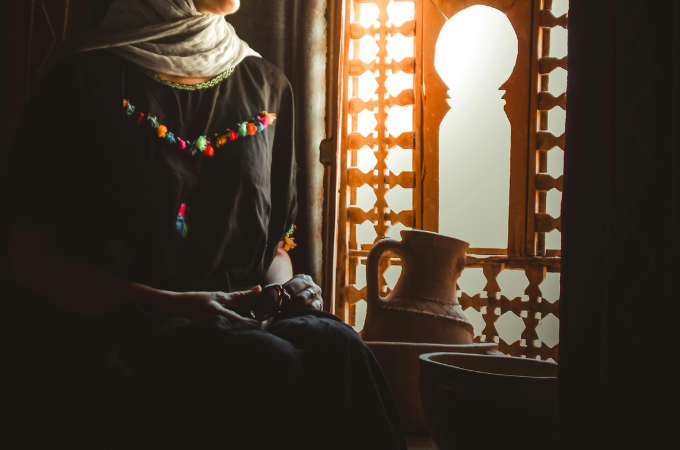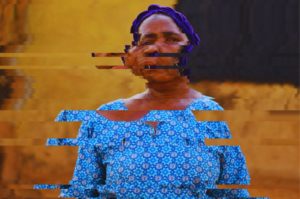
Aroused by Touda’s thick voice and the echoes of her usual cursing words, “Nker Atamaadourt — wake up, you idiot,” Samira opened her eyelids as though it were a gruelling ordeal. She habitually entertained the wish of waking up somewhere else more polychromatic and peaceful or at least a little different from her asylum-like bedroom. She knew that she was not supposed to be asleep at the time, but it was the only way to interrupt her constant miserable existence, that and One Thousand and One Nights which she went through numberless times.
Prior to completely retrieving her consciousness, maybe out of fear, she uttered “Um, Ma…ma; I am awake.” She longed for more sleep, but that was not within the bounds of the potential in the world of Touda and Lhoucine. She reached out for her white scarf, while staring at the draped woman drawn by her sister Malak, whom Samira thought aptly named. It was Malak who taught her how to read and write, for Samira had never set foot in school—a decision made by Lhoucine and confirmed by Touda. He told her that she was not in need of school and that they made a mistake letting Malak be schooled. “All she needs,” shouted Touda, “is to know how to cook and clean.”
Samira never took her mother to task or blamed her, for she knew that she was afraid of her father, that she could not rethink or doubt any of his decisions. Lhoucine was a beast-like figure, with a half-white and half-black moustache and a shaven beard. He was a man of robust stature, with a certain asymmetry betwixt his shoulders — something he adeptly masked, so imperceptible that even his life’s companion remained oblivious to it. He himself came to believe his shoulders to be even. His character, Malak thought, could not be dissected even by Freud, for he was so complex that a sane person finds it hard to classify him neither among the sane nor the insane. Sometimes he came to his senses and at others he metamorphosed into pure evil. Whenever Samira prayed, it was her habit of asking Allah to torture her with anything, but not with a husband like her father. A schizophrenic was his name in the letters exchanged between Samira and Malak.
When he was a child, Lhoucine studied a year and half in the Quranic school, wherein he learnt how to read and write, yet — Samira thought — he was not taught how to understand. He misinterpreted verses from the Quran, leading to unbearable consequences. He read a verse about the fuel of hell, which — according to the verse — is people and stones. What he understood was to use fire and stones as a means of punishment for children’s misbehavior. Once, his ten-year old son, Yousef, came home late, around the call of Al-Isha prayer, he grabbed a kabab skewer and put it on the oven fire until it got bluish, then he striped the child of his shirt, and buried the skewer in his butt. He begged the father for mercy and cried, but to no avail. Then, he screamed at the top of his lungs that the birds on top of the lemon tree in their garden flew out of fear. The kid ran straight to his mother who put some Henna on the wound, with hopes to lessen the pain.
With little, to no, interest and energy to go to the wedding, she had only to do it for her mother’s sake — or to put it bluntly, if she did not go, Lhoucine would somewhat know and then use his leather belt upon her soft and fragile body. Fear was the impetus. Touda’s idea was that Samira would appeal to some strange woman at the ceremony, who in turn would persuade her son to have her as his wife. The thought of Samira wearing the bride’s dress was her only refuge, and this subject was her solace. She was more of a burden upon her mother’s shoulders, and the only way to scoop her out of the way was to have her married to a man in possession of good fortune. She felt that Hayat’s wedding stands as a promising opportunity to find her one.
Touda shouted in a bossy-like-tone, “Yallah, come on! You have to brew tea for your brothers and then take a bath. Try to hide that scar on your face; it is the reason you are still unmarried.”
“I’m still eighteen years old, Ma.” She searched for words to tell her that the cause behind the scar was the burning spoon she threw right at her face when she backtalked, but found none.
“Don’t backtalk. Do you want to stay in my house forever? Go to the kitchen and do as I said. We should be ready by the call of Al-Maghrib prayer. Your father could be here any minute.”
Samira could not shake the word father from her mind. Hummm, does a father force his daughter into marriage? Does a father hate his daughter so much? He’s never said anything good to me; he’s never even said a little hello! Maybe, that’s how fathers are, but wait, Hayat’s father is different; he is nothing like him; he obviously loves his kids and that’s why Hayat keeps talking about him; can she be lying? I don’t think so; why would she? On her birthday, he brought her a collection of books; I saw that with my naked eyes; I wish I had a father like him; that’s my destiny I suppose; don’t ask me if I love him or not, because that’s obvious; I don’t even know what love is! I have never been in love, and I have not received love; I don’t know how it tastes or looks like; No. I think I love my cat; she stays with me when I am bored and alone, but, wait, she once buried her nails into my belly; maybe, all creatures are made of good and evil; this means that even Ba has some good within; I cannot believe this. He is as evil as Satan; darkness prevails his face, and I cannot even stare at his red eyes more than a second; why am I thinking about him? Maybe, because he is the source of my misery; how can I get rid of him? Kill him! No, I am not a murderer; I cannot do it; he is my father, after all; your problem is you are softer and kind; I cannot change who I am; I cannot become like the person I hate the most; what’s the solution, then? I should talk to Ma about it; I don’t want to marry right now; I will tell her I am not ready yet; I cannot tell her this; she will throw all the furniture upon me; coward; you are a coward; I am nothing but realistic; I cannot afford another scar on my face; my face is already distorted, but I can send a letter to my sister; Ma listens to her; she may be able to talk her out of it—
“Is tea ready?”
“Yes, Ma.”
“Go now, take a shower and dress up.”
Strolling bathwards, a torrent of troubled thoughts devoured her thinking; she could not resist but go over them. I hate that Hayat is getting married; not like I’m envious, but I won’t have someone to argue with, after she moves to her husband’s house, which is miles away; marriage, marriage, marriage — I hate this word; how can a person get married before knowing who she is and what she wants in life; I cannot imagine myself with a man in bed; sex; my sister says it hurts the first time, and after that it grows into a mundane routine — something akin to brushing your teeth before going to sleep; she did not say much when I mentioned the word “pleasure”; why? I think she does not derive any pleasure; sex is for men; that’s why women get dowry; it’s like selling their body; oh! I cannot believe I’m thinking about this; what if Ma hears me; she cannot; this is happening only in my mind; I don’t want marriage; you see; it’s simple; you should say and forget about the consequences; use your voice; look at your sister; do you want to end up like her; all men think the same way.
Walking out of the bathroom, not remembering whether she used soap or not, Samira walked to her bedroom where she donned her mother’s beloved caftan. To her surprise, her father told her something nice, probably for the first time, seconded by her mother, “Your father is right; your face looks darkened after you take a bath.” Samira searched for words to respond to such a paradoxical complement, but found none. With a confusing look, half-smiling and half-frowning, she bowed before her mother and walked by.
Less darkened? What kind of mother says that? The kind of mother who was told the same thing by her mother and her mother by her mother and her mother by her mother until Eve; I wish I were a man; I would not have gone through all this; I would have gone to school and had a job and a house of my own; the best of it is that I would be able to go out whenever I want, even at night; at least I won’t be forced into marriage at this age—
“Have you dressed up?”
“Almost”
“You’d better harry up. You don’t want to go to this wedding with bruises all over your face.”
“I’m coming, Ma”
Staring at the broken mirror and putting on some traditional makeup — kohl, red ochre and rose water — she was taken by a string of thoughts, unable to divert her attention to focus on the scarf she was wearing. The scarf; the veil; the house; the kitchen; the bedroom; it’s not like I don’t like the scarf, but I just think my hair is beautiful and I want it to be moved by the breeze; slat, slat, slat; why they no longer forced women into wearing hijab; my mother said it gained a notorious reputation nowadays; I’m grateful it did; I wish the scarf did, too; I have no problem with the scarf; I just think it should not be imposed; Hayat’s father did not force her to wear it, but she chose to do so; all I need is a choice; all I need is a choice; were I born in a family less rigid, I would have lived a totally different life; fate; fate; fate; I think we don’t have free will; we are at the mercy of fate; it’s hard to swallow this fact, but it’s the only way left; I’m not saying it’s not fair because I don’t know what is fair to Allah; I’m… just… saying; I mean Shahrazade did not choose to be beautiful and liked by the psychopathic Shahrayer; she, however, knew how to deal with him to survive and protected the entire women of the village, too; but she had the art of storytelling; what do I have; the art of cooking! The art of self-blaming; the art of silence; I wish I went to school; wish, wish, wish; I really sympathize with the one who coined this word; a woman, of course; a Berber woman “living” beneath the shade of the Atlas Mountains—
“I’m coming for you,” the old woman shouted.
“I’m sorry, Ma.”
Walking through the hallway, Samira felt the urge to scream at the top of her lungs, but as usual could not vent it out. She wore her phony smile, pretending to be happy.










COMMENTS -
Reader Interactions